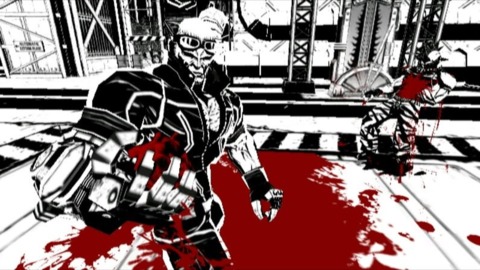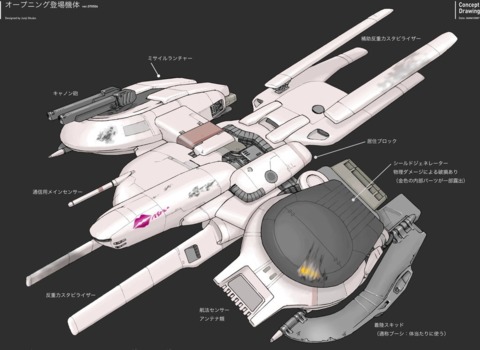Q&A: Sega brass talk Platinum deal
Publisher's US president and VP of marketing discuss their approach to making commercial hits from critical darlings; say new games won't be one-offs.
Last week, Sega announced that it had signed a deal with PlatinumGames, the spiritual successor to Capcom's shuttered Clover Studios. Led by many of Clover's familiar faces, Platinum boasts an all-star talent roster featuring Shinji Mikami (Resident Evil 4, God Hand), Atsushi Inaba (Okami, Viewtiful Joe), Hideki Kamiya (Resident Evil 2, Devil May Cry), and Hifumi Kuono (Clock Tower, Steel Battalion).

Currently there are four Platinum projects confirmed under way: the over-the-top gory Wii title Madworld, DS sci-fi role-playing game Infinite Line, cinematic PlayStation 3 and Xbox 360 action game Bayonetta, and an as yet unannounced project from Mikami. GameSpot sat down with Sega of America president and COO Simon Jeffery and VP of marketing Sean Ratcliffe at a San Francisco unveiling of the games to discuss the company's attraction to Platinum, how to ensure the games perform as well on the sales charts as they do in reviews, and the challenge of bringing Japanese games to a Western audience.
GameSpot: How did the PlatinumGames deal come about?
Simon Jeffery: I think as most of the people in the gaming media know, when these guys splintered away from Capcom, there was massive interest in what they would do. Their portfolio, talent, and track record is phenomenal, and publishers--especially the Japanese publishers--were intently interested in seeing what they wanted to do.
When ODD and Seeds merged to form PlatinumGames, they knew the direction they wanted to take. They wanted independence. They wanted to be able to make games on multiple formats, and we along with most of the gaming publishers started courting them. It just worked out that we were able to offer them the kind of freedom and independence to build the games they wanted to build.
The guys at Platinum are just at the top of their game right now, and what they've delivered is so clearly AAA in every way, when they started to show us product, we had to have it.
GS: Their games so far have been more successful critically than commercially. How are you going to address that?
SJ: I kind of argue with some of that. Devil May Cry sold huge, but in general, yeah, you could categorize some of their products in that manner. I think that might be because even though I'm a huge fan of Capcom, it's still run in the West as a very Japanese company. Sega is run in the West as a Western company. All of the Sega management in North America and Europe is Western management. We really believe that with strong marketing competency and sales competency with people who are experienced selling games in the West, we can help bring these games Platinum is building to the West and make them commercially successful as well as critically successful.
Sean Ratcliffe: It's a challenge for us to take this content and make it successful, but it's the same challenge we face every day with any sort of game. It's not particularly because it comes from PlatinumGames. How do we make any title the most successful it can be?
GS: Is this just an issue with marketing and how it's presented to people instead of actual content? Do you tell them, "Maybe you don't want to have the character put that chainsaw in that particular place?"

SJ: These guys are let to do whatever they want. They built the trailers. They build the games. We help them with the marketing direction. We think the games they're building are world-class on literally a world basis. We want to help them sell those games in the West, and we see Sega as providing them with advice on what will work, what won't work, what might be too much blood for the [Entertainment Software Rating Board] in the case of Madworld...
But these guys are some of the best guys there have ever been at building game content in our industry, so we want to trust them and respect them for their accomplishments and what they'll build in the future. There's a trust investment as well as a financial investment, and we really want to deliver on that.
SR: We don't see the role of marketing somehow diluting this content down. We are working with these guys because they show an inordinate amount of innovation and creativity in what they're doing. Our role in marketing and publishing is to harness that, shape it, make sure we're not running afoul of the ESRB, but not diluting it.
GS: Is this deal exclusive, or can Platinum work here and there for other publishers?
SJ: It's completely exclusive.
GS: Do the intellectual property rights for these brands stay with Sega or Platinum Games?
SJ: Sega.
GS: What's the battle plan for establishing three or four original IPs in the marketplace now? You've so far made a big deal about PlatinumGames as a brand, but will you build all the marketing around the developers?
SJ: We absolutely believe that the franchises we introduced tonight will drip feed tonight. We showed more on Madworld for a reason. There's more there, and we don't want to oversaturate with three products at the same time. Madworld is probably going to be the first to market. We really want to make sure there's distance between [games]. One of the great things about the way Platinum is structured is that they want their creative directors to run their own lines. So these franchises will be built over a long term. What we've seen today is the starting point, but all of those games--Bayonetta, Madworld, Infinite Line--won't be one-offs. They're all uniquely different enough from everything in their space to build complete franchises out of. The whole foundation of PlatinumGames is built around that long-term strategy. They don't just want to make a quick buck and throw out a few games. They've been in the business long enough to know what works, and they really want to pretty much establish themselves as gaming gods.
GS: When Platinum president and CEO Tatsuya Minami introduced the slate of games to the press, he commended Sega for having the "courage" to sign PlatinumGames. What did he mean by that?
SJ: Quite literally, we believe in their independence and we gave them their independence. We don't want to force them to do something they don't believe in. We don't want to force them to do something that isn't right for the games they're building, or something that might be right for this market but not that market. We think they're smart enough and proven enough to build world-class games and I think these guys appreciate that we're letting them do their own thing and not being the big bully publishers.

SR: In today's world, publishers are businesses at the end of the day, so they have to turn a profit. That leads to a more formulaic approach, sort of building games and properties and franchises. In some cases, publishers acquire studios because of creativity or proficiency in a genre they're lacking, but slowly and surely they knock out the creativity by becoming like an overbearing parent. "You can't do this, we don't want you to do that." What Sega's doing is saying, "We want to work with you because of your creativity. We don't want to destroy that; we want to encourage that."
GS: The platform choices could be key for some of these titles. How are the conversations about what titles end up where going to go?
SJ: These guys are platform-agnostic. Bayonetta's on the next-gen platforms, Madworld's on the Wii... One of the things we really like about them is they're building teams and expertise around specific platforms. Instead of saying, "Today you're doing it on this, and tomorrow you're doing it on that," they're really trying to build up and leverage expertise. The stuff they're building on Bayonetta is the best stuff I've seen on next-gen. It's absolutely outstanding.
But we're not concerned about what happens on platforms or where they might go. These guys are smart enough, savvy enough, and broad enough to go any which way.
SR: In the last hardware cycle, there were clear winners in terms of hardware. But it's a different sort of dynamic now in terms of hardware and penetration of hardware. I think the idea of sticking to one platform is an idea most people are moving away from. We're looking at development on multiple platforms here so it's not a huge concern for us.
GS: In recent years you've been teaming with Western developers a lot, either acquiring them or shopping out external development to them. That seemed to be a change in strategy for Sega. Does this deal with a Japanese developer signal another change in your approach?
SJ: Not really. I think it's a reflection of what's happening in the Japanese market and where Sega feels we need to be with bringing Japanese product to the West. We look at games like Metal Gear Solid and see the fantastic success and penetration and market acceptance they've had in the West. Sega wants to bring more products from Japan that are globally appropriate to the Western market.
GS: What's different about bringing a Japanese game to American market instead of a Western game?
SJ: Well, 90 percent of games built in Japan don't sell in the West, and 90 or 95 percent of games built in the West don't sell in Japan. There's just a huge cultural divide, a huge cultural disconnect. If you look at the sell-through charts in Japan on a weekly basis, you'd probably recognize one of those games as having made any kind of penetration in Western markets. However, there are games like Devil May Cry, Metal Gear Solid, Final Fantasy, that have hit a critical mass of commercial appeal as well as resonating with gaming press. We want to get the balance right and ensure that we have our share of those games. But you're right, a lot of our business is about building games in the West for the West.
SR: We need that balanced portfolio. We want games for kids and families, core gamers, casual gamers, mobile and handheld gamers, and so on. We have got to have that broad view, and that means the development strategy--working only with one type of developer, or only in one part of the world--that binary approach doesn't work anymore. As a global company, we have to have that balanced view. It's not alien to what we're doing; it's a key part of what we're doing.
Got a news tip or want to contact us directly? Email news@gamespot.com
Join the conversation